Identifying the Impact of Binge Watching TV on Psychological Health
VerifiedAdded on 2021/02/20
|8
|2322
|175
Report
AI Summary
This research proposal investigates the impact of binge-watching TV on the psychological health of individuals. It begins with an introduction that defines binge-watching and highlights its increasing prevalence, particularly among Australians. The proposal aims to identify how binge-watching affects psychological health, including its impact on mental well-being and potential strategies to reduce its influence. The literature review explores the concept of binge-watching, its effects on mental health (such as increased stress, depression, and anxiety), and strategies to mitigate these effects, such as setting time limits and watching with others. The significance of the research lies in its relevance to the growing issue of binge-watching in society, with data showing a rapid increase in consumption. The proposed methodology includes a qualitative approach using questionnaires, along with ethical considerations. The report also acknowledges limitations, such as the constraints of using close-ended questions. The scope is broad, aiming to provide a foundation for future research and inform individuals about the impact of binge-watching and strategies for reduction. The research references a variety of books, journals, and online articles to support the findings.

Research Proposal
Paraphrase This Document
Need a fresh take? Get an instant paraphrase of this document with our AI Paraphraser
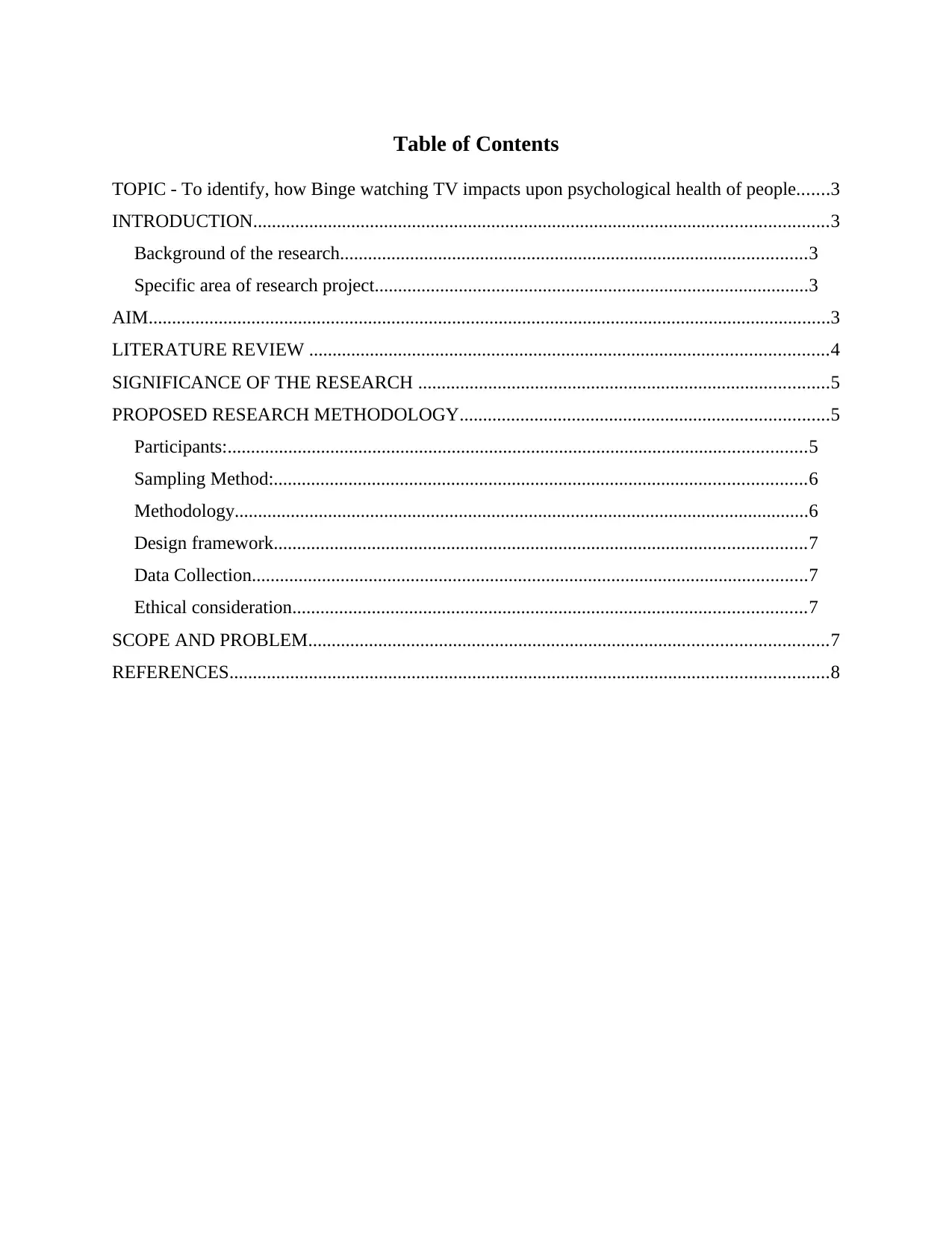
Table of Contents
TOPIC - To identify, how Binge watching TV impacts upon psychological health of people.......3
INTRODUCTION...........................................................................................................................3
Background of the research....................................................................................................3
Specific area of research project.............................................................................................3
AIM..................................................................................................................................................3
LITERATURE REVIEW ...............................................................................................................4
SIGNIFICANCE OF THE RESEARCH ........................................................................................5
PROPOSED RESEARCH METHODOLOGY...............................................................................5
Participants:............................................................................................................................5
Sampling Method:..................................................................................................................6
Methodology...........................................................................................................................6
Design framework..................................................................................................................7
Data Collection.......................................................................................................................7
Ethical consideration..............................................................................................................7
SCOPE AND PROBLEM...............................................................................................................7
REFERENCES................................................................................................................................8
TOPIC - To identify, how Binge watching TV impacts upon psychological health of people.......3
INTRODUCTION...........................................................................................................................3
Background of the research....................................................................................................3
Specific area of research project.............................................................................................3
AIM..................................................................................................................................................3
LITERATURE REVIEW ...............................................................................................................4
SIGNIFICANCE OF THE RESEARCH ........................................................................................5
PROPOSED RESEARCH METHODOLOGY...............................................................................5
Participants:............................................................................................................................5
Sampling Method:..................................................................................................................6
Methodology...........................................................................................................................6
Design framework..................................................................................................................7
Data Collection.......................................................................................................................7
Ethical consideration..............................................................................................................7
SCOPE AND PROBLEM...............................................................................................................7
REFERENCES................................................................................................................................8
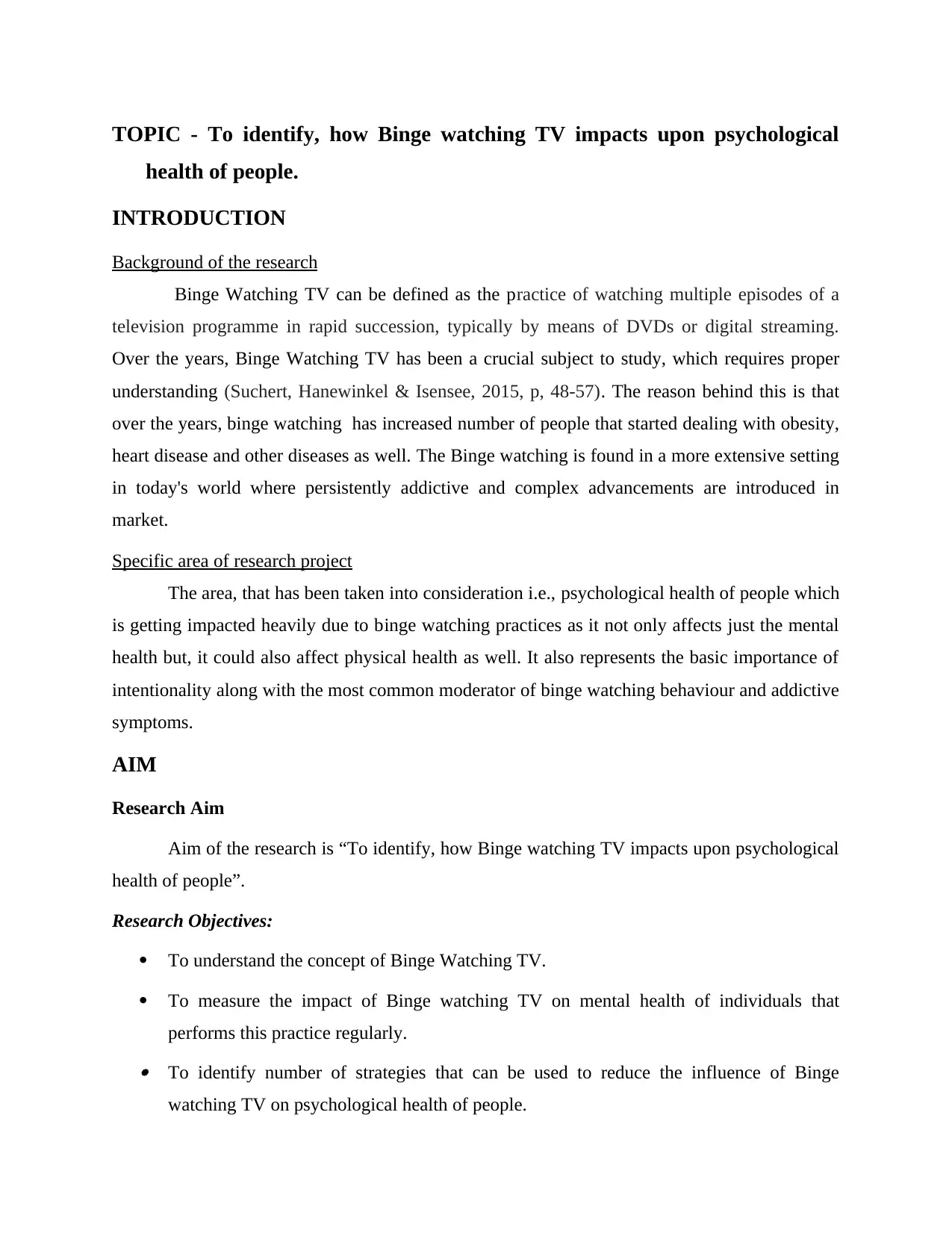
TOPIC - To identify, how Binge watching TV impacts upon psychological
health of people.
INTRODUCTION
Background of the research
Binge Watching TV can be defined as the practice of watching multiple episodes of a
television programme in rapid succession, typically by means of DVDs or digital streaming.
Over the years, Binge Watching TV has been a crucial subject to study, which requires proper
understanding (Suchert, Hanewinkel & Isensee, 2015, p, 48-57). The reason behind this is that
over the years, binge watching has increased number of people that started dealing with obesity,
heart disease and other diseases as well. The Binge watching is found in a more extensive setting
in today's world where persistently addictive and complex advancements are introduced in
market.
Specific area of research project
The area, that has been taken into consideration i.e., psychological health of people which
is getting impacted heavily due to binge watching practices as it not only affects just the mental
health but, it could also affect physical health as well. It also represents the basic importance of
intentionality along with the most common moderator of binge watching behaviour and addictive
symptoms.
AIM
Research Aim
Aim of the research is “To identify, how Binge watching TV impacts upon psychological
health of people”.
Research Objectives:
To understand the concept of Binge Watching TV.
To measure the impact of Binge watching TV on mental health of individuals that
performs this practice regularly. To identify number of strategies that can be used to reduce the influence of Binge
watching TV on psychological health of people.
health of people.
INTRODUCTION
Background of the research
Binge Watching TV can be defined as the practice of watching multiple episodes of a
television programme in rapid succession, typically by means of DVDs or digital streaming.
Over the years, Binge Watching TV has been a crucial subject to study, which requires proper
understanding (Suchert, Hanewinkel & Isensee, 2015, p, 48-57). The reason behind this is that
over the years, binge watching has increased number of people that started dealing with obesity,
heart disease and other diseases as well. The Binge watching is found in a more extensive setting
in today's world where persistently addictive and complex advancements are introduced in
market.
Specific area of research project
The area, that has been taken into consideration i.e., psychological health of people which
is getting impacted heavily due to binge watching practices as it not only affects just the mental
health but, it could also affect physical health as well. It also represents the basic importance of
intentionality along with the most common moderator of binge watching behaviour and addictive
symptoms.
AIM
Research Aim
Aim of the research is “To identify, how Binge watching TV impacts upon psychological
health of people”.
Research Objectives:
To understand the concept of Binge Watching TV.
To measure the impact of Binge watching TV on mental health of individuals that
performs this practice regularly. To identify number of strategies that can be used to reduce the influence of Binge
watching TV on psychological health of people.
⊘ This is a preview!⊘
Do you want full access?
Subscribe today to unlock all pages.

Trusted by 1+ million students worldwide
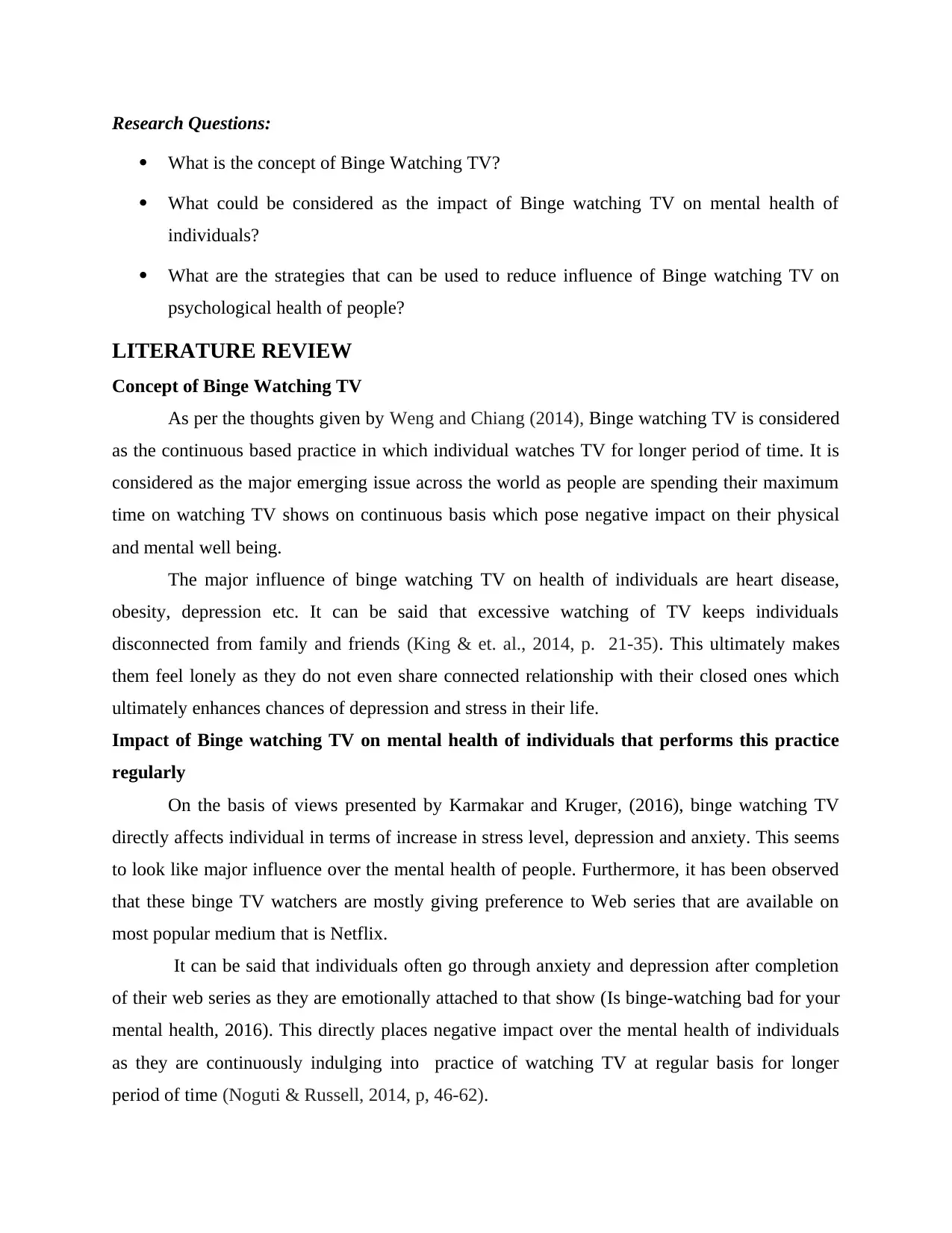
Research Questions:
What is the concept of Binge Watching TV?
What could be considered as the impact of Binge watching TV on mental health of
individuals?
What are the strategies that can be used to reduce influence of Binge watching TV on
psychological health of people?
LITERATURE REVIEW
Concept of Binge Watching TV
As per the thoughts given by Weng and Chiang (2014), Binge watching TV is considered
as the continuous based practice in which individual watches TV for longer period of time. It is
considered as the major emerging issue across the world as people are spending their maximum
time on watching TV shows on continuous basis which pose negative impact on their physical
and mental well being.
The major influence of binge watching TV on health of individuals are heart disease,
obesity, depression etc. It can be said that excessive watching of TV keeps individuals
disconnected from family and friends (King & et. al., 2014, p. 21-35). This ultimately makes
them feel lonely as they do not even share connected relationship with their closed ones which
ultimately enhances chances of depression and stress in their life.
Impact of Binge watching TV on mental health of individuals that performs this practice
regularly
On the basis of views presented by Karmakar and Kruger, (2016), binge watching TV
directly affects individual in terms of increase in stress level, depression and anxiety. This seems
to look like major influence over the mental health of people. Furthermore, it has been observed
that these binge TV watchers are mostly giving preference to Web series that are available on
most popular medium that is Netflix.
It can be said that individuals often go through anxiety and depression after completion
of their web series as they are emotionally attached to that show (Is binge-watching bad for your
mental health, 2016). This directly places negative impact over the mental health of individuals
as they are continuously indulging into practice of watching TV at regular basis for longer
period of time (Noguti & Russell, 2014, p, 46-62).
What is the concept of Binge Watching TV?
What could be considered as the impact of Binge watching TV on mental health of
individuals?
What are the strategies that can be used to reduce influence of Binge watching TV on
psychological health of people?
LITERATURE REVIEW
Concept of Binge Watching TV
As per the thoughts given by Weng and Chiang (2014), Binge watching TV is considered
as the continuous based practice in which individual watches TV for longer period of time. It is
considered as the major emerging issue across the world as people are spending their maximum
time on watching TV shows on continuous basis which pose negative impact on their physical
and mental well being.
The major influence of binge watching TV on health of individuals are heart disease,
obesity, depression etc. It can be said that excessive watching of TV keeps individuals
disconnected from family and friends (King & et. al., 2014, p. 21-35). This ultimately makes
them feel lonely as they do not even share connected relationship with their closed ones which
ultimately enhances chances of depression and stress in their life.
Impact of Binge watching TV on mental health of individuals that performs this practice
regularly
On the basis of views presented by Karmakar and Kruger, (2016), binge watching TV
directly affects individual in terms of increase in stress level, depression and anxiety. This seems
to look like major influence over the mental health of people. Furthermore, it has been observed
that these binge TV watchers are mostly giving preference to Web series that are available on
most popular medium that is Netflix.
It can be said that individuals often go through anxiety and depression after completion
of their web series as they are emotionally attached to that show (Is binge-watching bad for your
mental health, 2016). This directly places negative impact over the mental health of individuals
as they are continuously indulging into practice of watching TV at regular basis for longer
period of time (Noguti & Russell, 2014, p, 46-62).
Paraphrase This Document
Need a fresh take? Get an instant paraphrase of this document with our AI Paraphraser
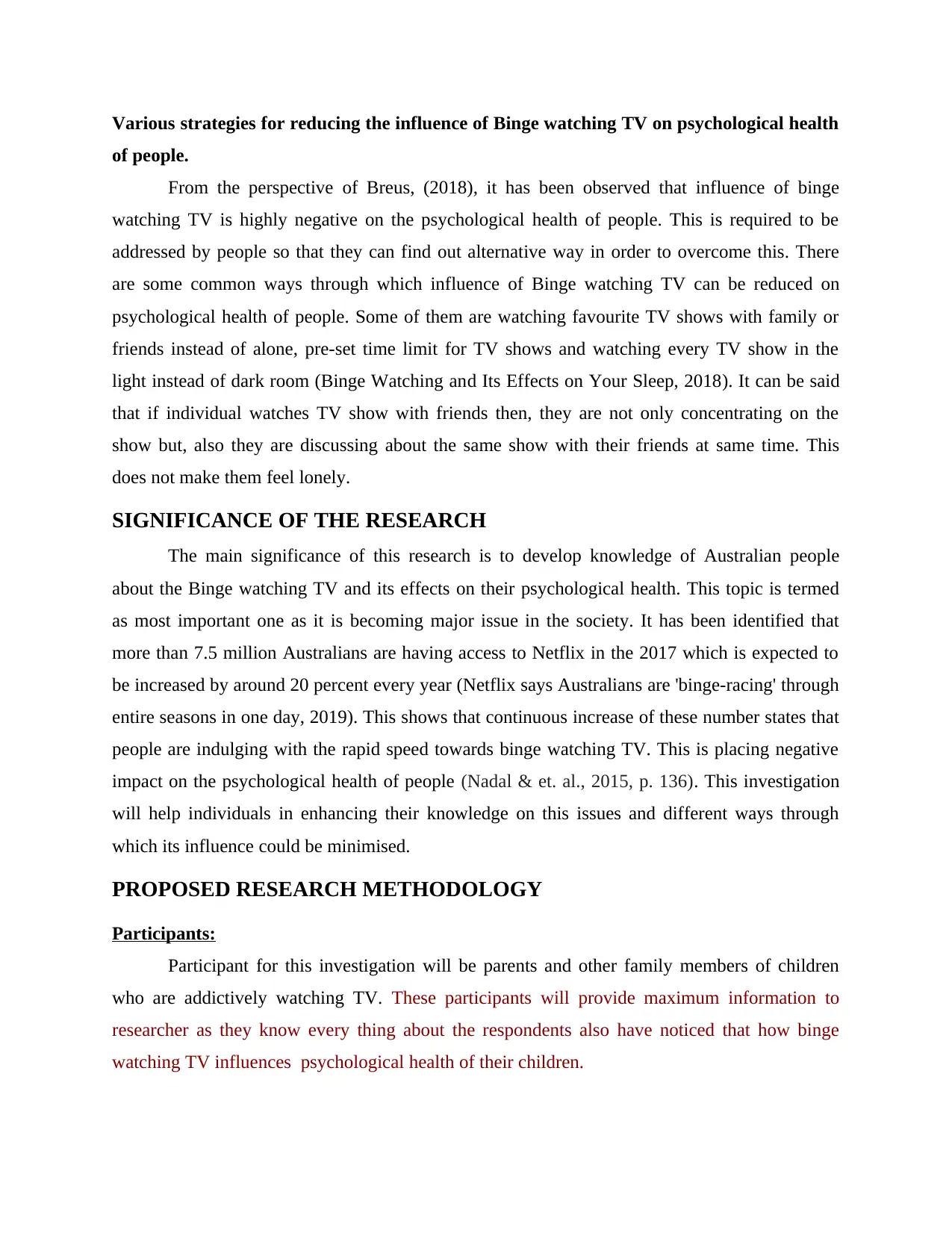
Various strategies for reducing the influence of Binge watching TV on psychological health
of people.
From the perspective of Breus, (2018), it has been observed that influence of binge
watching TV is highly negative on the psychological health of people. This is required to be
addressed by people so that they can find out alternative way in order to overcome this. There
are some common ways through which influence of Binge watching TV can be reduced on
psychological health of people. Some of them are watching favourite TV shows with family or
friends instead of alone, pre-set time limit for TV shows and watching every TV show in the
light instead of dark room (Binge Watching and Its Effects on Your Sleep, 2018). It can be said
that if individual watches TV show with friends then, they are not only concentrating on the
show but, also they are discussing about the same show with their friends at same time. This
does not make them feel lonely.
SIGNIFICANCE OF THE RESEARCH
The main significance of this research is to develop knowledge of Australian people
about the Binge watching TV and its effects on their psychological health. This topic is termed
as most important one as it is becoming major issue in the society. It has been identified that
more than 7.5 million Australians are having access to Netflix in the 2017 which is expected to
be increased by around 20 percent every year (Netflix says Australians are 'binge-racing' through
entire seasons in one day, 2019). This shows that continuous increase of these number states that
people are indulging with the rapid speed towards binge watching TV. This is placing negative
impact on the psychological health of people (Nadal & et. al., 2015, p. 136). This investigation
will help individuals in enhancing their knowledge on this issues and different ways through
which its influence could be minimised.
PROPOSED RESEARCH METHODOLOGY
Participants:
Participant for this investigation will be parents and other family members of children
who are addictively watching TV. These participants will provide maximum information to
researcher as they know every thing about the respondents also have noticed that how binge
watching TV influences psychological health of their children.
of people.
From the perspective of Breus, (2018), it has been observed that influence of binge
watching TV is highly negative on the psychological health of people. This is required to be
addressed by people so that they can find out alternative way in order to overcome this. There
are some common ways through which influence of Binge watching TV can be reduced on
psychological health of people. Some of them are watching favourite TV shows with family or
friends instead of alone, pre-set time limit for TV shows and watching every TV show in the
light instead of dark room (Binge Watching and Its Effects on Your Sleep, 2018). It can be said
that if individual watches TV show with friends then, they are not only concentrating on the
show but, also they are discussing about the same show with their friends at same time. This
does not make them feel lonely.
SIGNIFICANCE OF THE RESEARCH
The main significance of this research is to develop knowledge of Australian people
about the Binge watching TV and its effects on their psychological health. This topic is termed
as most important one as it is becoming major issue in the society. It has been identified that
more than 7.5 million Australians are having access to Netflix in the 2017 which is expected to
be increased by around 20 percent every year (Netflix says Australians are 'binge-racing' through
entire seasons in one day, 2019). This shows that continuous increase of these number states that
people are indulging with the rapid speed towards binge watching TV. This is placing negative
impact on the psychological health of people (Nadal & et. al., 2015, p. 136). This investigation
will help individuals in enhancing their knowledge on this issues and different ways through
which its influence could be minimised.
PROPOSED RESEARCH METHODOLOGY
Participants:
Participant for this investigation will be parents and other family members of children
who are addictively watching TV. These participants will provide maximum information to
researcher as they know every thing about the respondents also have noticed that how binge
watching TV influences psychological health of their children.
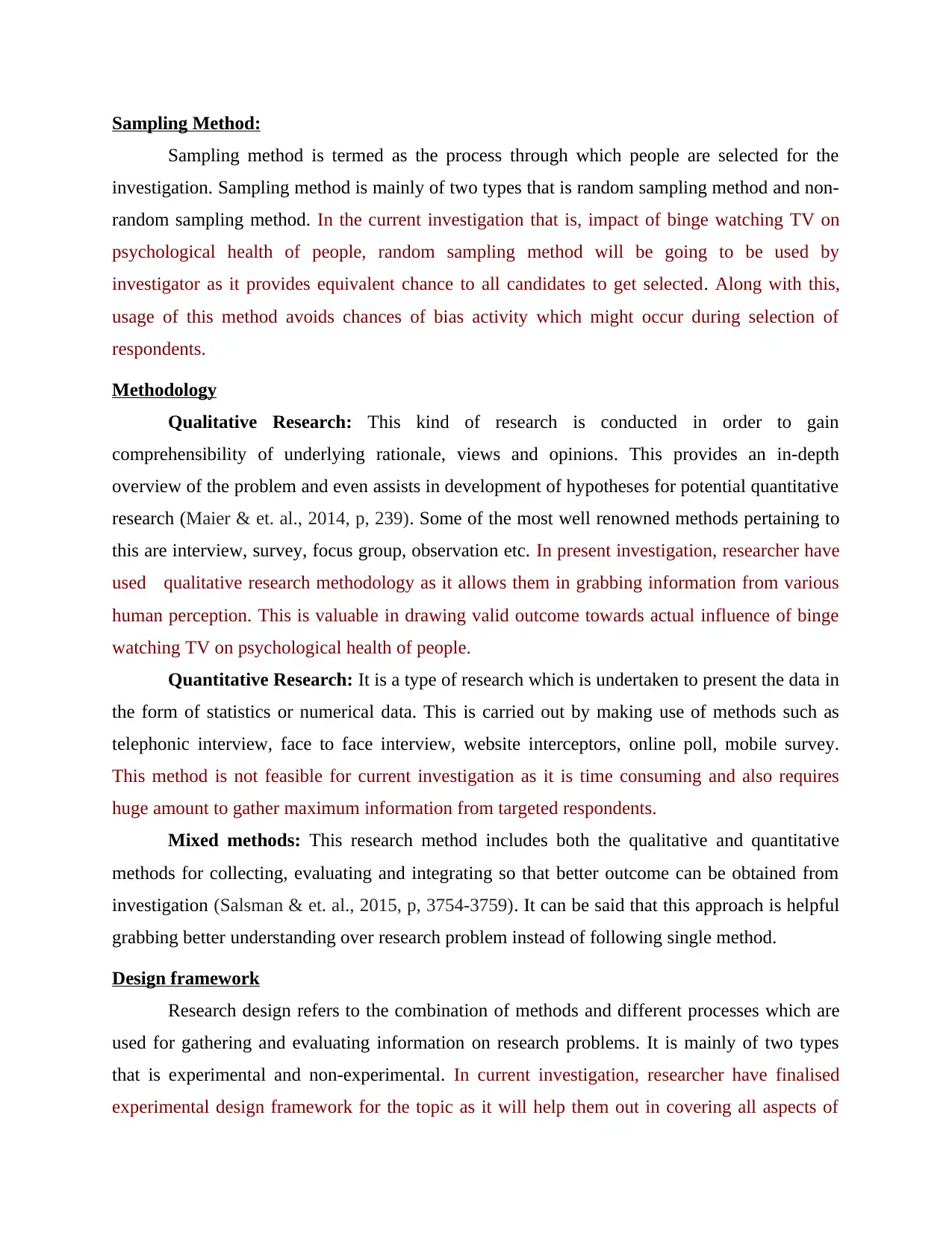
Sampling Method:
Sampling method is termed as the process through which people are selected for the
investigation. Sampling method is mainly of two types that is random sampling method and non-
random sampling method. In the current investigation that is, impact of binge watching TV on
psychological health of people, random sampling method will be going to be used by
investigator as it provides equivalent chance to all candidates to get selected. Along with this,
usage of this method avoids chances of bias activity which might occur during selection of
respondents.
Methodology
Qualitative Research: This kind of research is conducted in order to gain
comprehensibility of underlying rationale, views and opinions. This provides an in-depth
overview of the problem and even assists in development of hypotheses for potential quantitative
research (Maier & et. al., 2014, p, 239). Some of the most well renowned methods pertaining to
this are interview, survey, focus group, observation etc. In present investigation, researcher have
used qualitative research methodology as it allows them in grabbing information from various
human perception. This is valuable in drawing valid outcome towards actual influence of binge
watching TV on psychological health of people.
Quantitative Research: It is a type of research which is undertaken to present the data in
the form of statistics or numerical data. This is carried out by making use of methods such as
telephonic interview, face to face interview, website interceptors, online poll, mobile survey.
This method is not feasible for current investigation as it is time consuming and also requires
huge amount to gather maximum information from targeted respondents.
Mixed methods: This research method includes both the qualitative and quantitative
methods for collecting, evaluating and integrating so that better outcome can be obtained from
investigation (Salsman & et. al., 2015, p, 3754-3759). It can be said that this approach is helpful
grabbing better understanding over research problem instead of following single method.
Design framework
Research design refers to the combination of methods and different processes which are
used for gathering and evaluating information on research problems. It is mainly of two types
that is experimental and non-experimental. In current investigation, researcher have finalised
experimental design framework for the topic as it will help them out in covering all aspects of
Sampling method is termed as the process through which people are selected for the
investigation. Sampling method is mainly of two types that is random sampling method and non-
random sampling method. In the current investigation that is, impact of binge watching TV on
psychological health of people, random sampling method will be going to be used by
investigator as it provides equivalent chance to all candidates to get selected. Along with this,
usage of this method avoids chances of bias activity which might occur during selection of
respondents.
Methodology
Qualitative Research: This kind of research is conducted in order to gain
comprehensibility of underlying rationale, views and opinions. This provides an in-depth
overview of the problem and even assists in development of hypotheses for potential quantitative
research (Maier & et. al., 2014, p, 239). Some of the most well renowned methods pertaining to
this are interview, survey, focus group, observation etc. In present investigation, researcher have
used qualitative research methodology as it allows them in grabbing information from various
human perception. This is valuable in drawing valid outcome towards actual influence of binge
watching TV on psychological health of people.
Quantitative Research: It is a type of research which is undertaken to present the data in
the form of statistics or numerical data. This is carried out by making use of methods such as
telephonic interview, face to face interview, website interceptors, online poll, mobile survey.
This method is not feasible for current investigation as it is time consuming and also requires
huge amount to gather maximum information from targeted respondents.
Mixed methods: This research method includes both the qualitative and quantitative
methods for collecting, evaluating and integrating so that better outcome can be obtained from
investigation (Salsman & et. al., 2015, p, 3754-3759). It can be said that this approach is helpful
grabbing better understanding over research problem instead of following single method.
Design framework
Research design refers to the combination of methods and different processes which are
used for gathering and evaluating information on research problems. It is mainly of two types
that is experimental and non-experimental. In current investigation, researcher have finalised
experimental design framework for the topic as it will help them out in covering all aspects of
⊘ This is a preview!⊘
Do you want full access?
Subscribe today to unlock all pages.

Trusted by 1+ million students worldwide
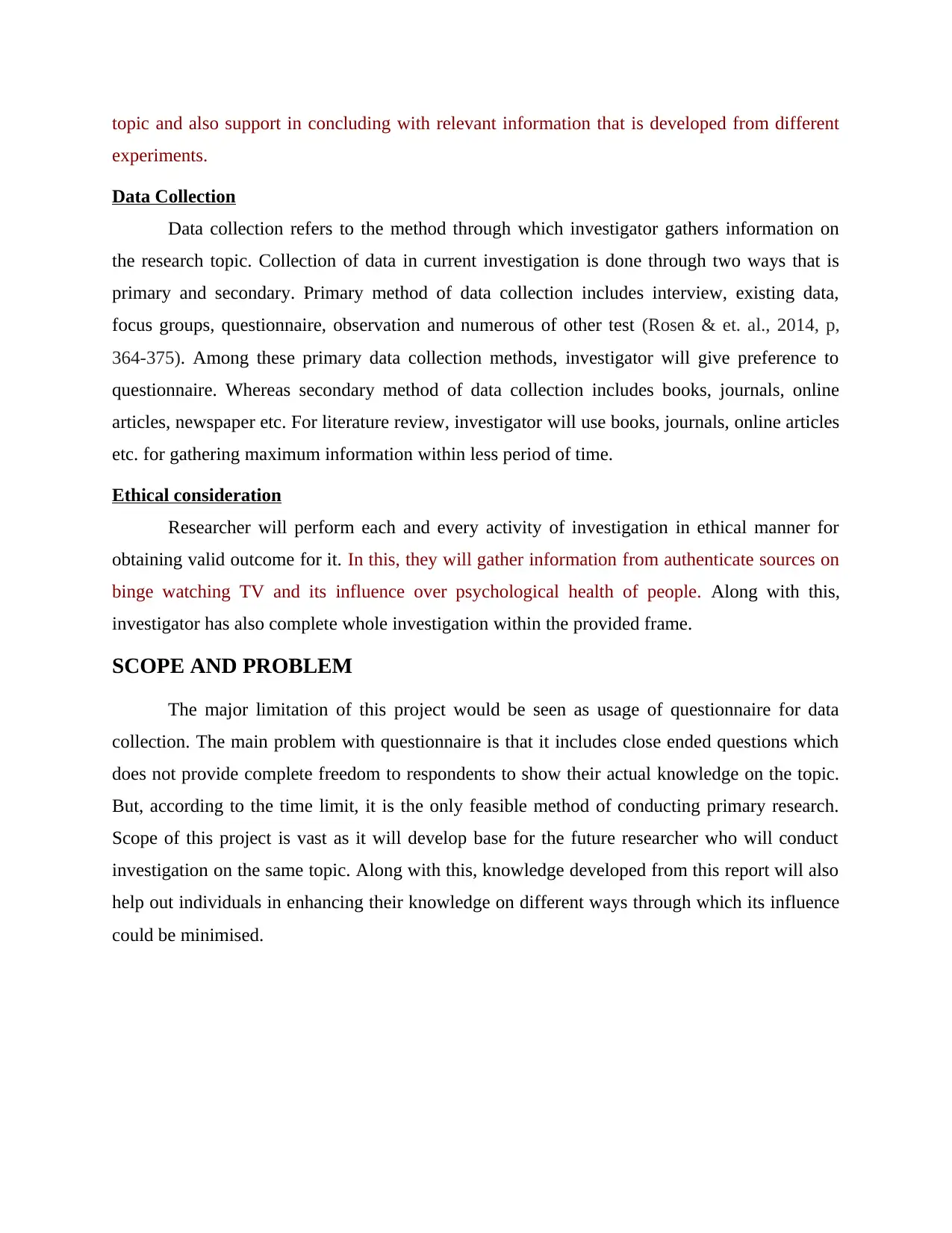
topic and also support in concluding with relevant information that is developed from different
experiments.
Data Collection
Data collection refers to the method through which investigator gathers information on
the research topic. Collection of data in current investigation is done through two ways that is
primary and secondary. Primary method of data collection includes interview, existing data,
focus groups, questionnaire, observation and numerous of other test (Rosen & et. al., 2014, p,
364-375). Among these primary data collection methods, investigator will give preference to
questionnaire. Whereas secondary method of data collection includes books, journals, online
articles, newspaper etc. For literature review, investigator will use books, journals, online articles
etc. for gathering maximum information within less period of time.
Ethical consideration
Researcher will perform each and every activity of investigation in ethical manner for
obtaining valid outcome for it. In this, they will gather information from authenticate sources on
binge watching TV and its influence over psychological health of people. Along with this,
investigator has also complete whole investigation within the provided frame.
SCOPE AND PROBLEM
The major limitation of this project would be seen as usage of questionnaire for data
collection. The main problem with questionnaire is that it includes close ended questions which
does not provide complete freedom to respondents to show their actual knowledge on the topic.
But, according to the time limit, it is the only feasible method of conducting primary research.
Scope of this project is vast as it will develop base for the future researcher who will conduct
investigation on the same topic. Along with this, knowledge developed from this report will also
help out individuals in enhancing their knowledge on different ways through which its influence
could be minimised.
experiments.
Data Collection
Data collection refers to the method through which investigator gathers information on
the research topic. Collection of data in current investigation is done through two ways that is
primary and secondary. Primary method of data collection includes interview, existing data,
focus groups, questionnaire, observation and numerous of other test (Rosen & et. al., 2014, p,
364-375). Among these primary data collection methods, investigator will give preference to
questionnaire. Whereas secondary method of data collection includes books, journals, online
articles, newspaper etc. For literature review, investigator will use books, journals, online articles
etc. for gathering maximum information within less period of time.
Ethical consideration
Researcher will perform each and every activity of investigation in ethical manner for
obtaining valid outcome for it. In this, they will gather information from authenticate sources on
binge watching TV and its influence over psychological health of people. Along with this,
investigator has also complete whole investigation within the provided frame.
SCOPE AND PROBLEM
The major limitation of this project would be seen as usage of questionnaire for data
collection. The main problem with questionnaire is that it includes close ended questions which
does not provide complete freedom to respondents to show their actual knowledge on the topic.
But, according to the time limit, it is the only feasible method of conducting primary research.
Scope of this project is vast as it will develop base for the future researcher who will conduct
investigation on the same topic. Along with this, knowledge developed from this report will also
help out individuals in enhancing their knowledge on different ways through which its influence
could be minimised.
Paraphrase This Document
Need a fresh take? Get an instant paraphrase of this document with our AI Paraphraser
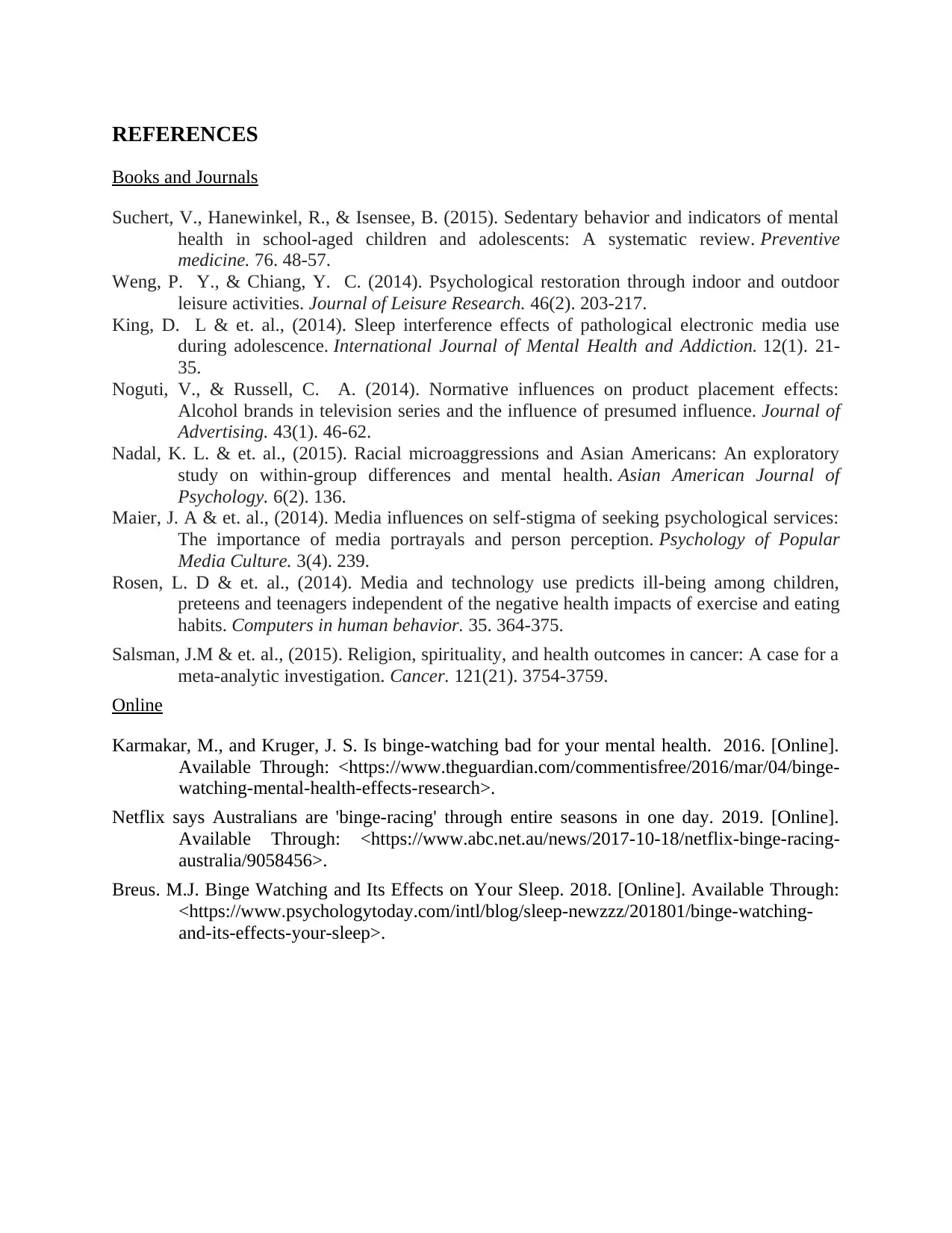
REFERENCES
Books and Journals
Suchert, V., Hanewinkel, R., & Isensee, B. (2015). Sedentary behavior and indicators of mental
health in school-aged children and adolescents: A systematic review. Preventive
medicine. 76. 48-57.
Weng, P. Y., & Chiang, Y. C. (2014). Psychological restoration through indoor and outdoor
leisure activities. Journal of Leisure Research. 46(2). 203-217.
King, D. L & et. al., (2014). Sleep interference effects of pathological electronic media use
during adolescence. International Journal of Mental Health and Addiction. 12(1). 21-
35.
Noguti, V., & Russell, C. A. (2014). Normative influences on product placement effects:
Alcohol brands in television series and the influence of presumed influence. Journal of
Advertising. 43(1). 46-62.
Nadal, K. L. & et. al., (2015). Racial microaggressions and Asian Americans: An exploratory
study on within-group differences and mental health. Asian American Journal of
Psychology. 6(2). 136.
Maier, J. A & et. al., (2014). Media influences on self-stigma of seeking psychological services:
The importance of media portrayals and person perception. Psychology of Popular
Media Culture. 3(4). 239.
Rosen, L. D & et. al., (2014). Media and technology use predicts ill-being among children,
preteens and teenagers independent of the negative health impacts of exercise and eating
habits. Computers in human behavior. 35. 364-375.
Salsman, J.M & et. al., (2015). Religion, spirituality, and health outcomes in cancer: A case for a
meta‐analytic investigation. Cancer. 121(21). 3754-3759.
Online
Karmakar, M., and Kruger, J. S. Is binge-watching bad for your mental health. 2016. [Online].
Available Through: <https://www.theguardian.com/commentisfree/2016/mar/04/binge-
watching-mental-health-effects-research>.
Netflix says Australians are 'binge-racing' through entire seasons in one day. 2019. [Online].
Available Through: <https://www.abc.net.au/news/2017-10-18/netflix-binge-racing-
australia/9058456>.
Breus. M.J. Binge Watching and Its Effects on Your Sleep. 2018. [Online]. Available Through:
<https://www.psychologytoday.com/intl/blog/sleep-newzzz/201801/binge-watching-
and-its-effects-your-sleep>.
Books and Journals
Suchert, V., Hanewinkel, R., & Isensee, B. (2015). Sedentary behavior and indicators of mental
health in school-aged children and adolescents: A systematic review. Preventive
medicine. 76. 48-57.
Weng, P. Y., & Chiang, Y. C. (2014). Psychological restoration through indoor and outdoor
leisure activities. Journal of Leisure Research. 46(2). 203-217.
King, D. L & et. al., (2014). Sleep interference effects of pathological electronic media use
during adolescence. International Journal of Mental Health and Addiction. 12(1). 21-
35.
Noguti, V., & Russell, C. A. (2014). Normative influences on product placement effects:
Alcohol brands in television series and the influence of presumed influence. Journal of
Advertising. 43(1). 46-62.
Nadal, K. L. & et. al., (2015). Racial microaggressions and Asian Americans: An exploratory
study on within-group differences and mental health. Asian American Journal of
Psychology. 6(2). 136.
Maier, J. A & et. al., (2014). Media influences on self-stigma of seeking psychological services:
The importance of media portrayals and person perception. Psychology of Popular
Media Culture. 3(4). 239.
Rosen, L. D & et. al., (2014). Media and technology use predicts ill-being among children,
preteens and teenagers independent of the negative health impacts of exercise and eating
habits. Computers in human behavior. 35. 364-375.
Salsman, J.M & et. al., (2015). Religion, spirituality, and health outcomes in cancer: A case for a
meta‐analytic investigation. Cancer. 121(21). 3754-3759.
Online
Karmakar, M., and Kruger, J. S. Is binge-watching bad for your mental health. 2016. [Online].
Available Through: <https://www.theguardian.com/commentisfree/2016/mar/04/binge-
watching-mental-health-effects-research>.
Netflix says Australians are 'binge-racing' through entire seasons in one day. 2019. [Online].
Available Through: <https://www.abc.net.au/news/2017-10-18/netflix-binge-racing-
australia/9058456>.
Breus. M.J. Binge Watching and Its Effects on Your Sleep. 2018. [Online]. Available Through:
<https://www.psychologytoday.com/intl/blog/sleep-newzzz/201801/binge-watching-
and-its-effects-your-sleep>.
1 out of 8
Related Documents
Your All-in-One AI-Powered Toolkit for Academic Success.
+13062052269
info@desklib.com
Available 24*7 on WhatsApp / Email
![[object Object]](/_next/static/media/star-bottom.7253800d.svg)
Unlock your academic potential
Copyright © 2020–2025 A2Z Services. All Rights Reserved. Developed and managed by ZUCOL.





